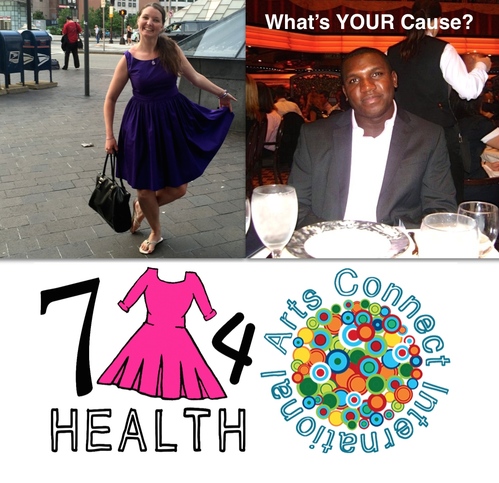Guest blogger bio: Ayokunle ‘Ayo’ Abogan is from Nigeria, and (as a young boy) went with his mother, now a retired midwife, to rural villages in Nigeria where she volunteered her midwife skills to those who had no healthcare facilities. He currently works with the National Malaria Programme in Botswana as an Associate with CHAI. He loves cooking, all things Red Sox and traveling.
Title: MNCH Programs Should Have An ASS FOCUS Approach
I have seen several MNCH projects launched, and, unfortunately, fail within few months. I like to think that these programs are not well structured during the planning, financing and execution phases. You are probably curious what does an ASS FOCUShave to do with MNCH? I came up with this acronym during a graduate school project on maternal care for Sub-Saharan Africa women. For my project, the acronym I came up with had to fulfill three criteria — (i) it needed to emphasis something women in the continent naturally have (hence ‘ass’ or butt came to mind), (ii) it has to be puzzling (serious, Ayo, ass?), and (iii) the acronym should only have eight letters. Before I continue, forgive me (female counterparts in particular) that I did not come up with something connected to the beauty, brains or caring nature of African women — I only had 30mins to develop this idea, else I will lose some points.
Okay, enough on the background, what is ASS FOCUS? I believe these are the components every MNCH programme should have, namely: Accountability, Sustainability, Simple, Functional, Organized, Compatibility, Usability and Substantiality. I will explain these components below:
Accountability: Here, the focus is on individuals, governments or agencies because they all have an obligation to assume responsibility for their actions and policies as it relates to the overall development and implementation of MNCH services. At times, program implementers are not answerable to targeted populations who are meant to benefit from specific health and non-health programs. Often, governments blame NGOs or donor agencies when services are not enough to cover the populations that need them (e.g. donor agencies not fulfilling financial obligations) or donor agencies blame governments when the quality of services provided are poor (e.g. the government failed to hire competent staff). Unfortunately, women and children suffer while these blame games are ongoing.
Sustainability: This component deals with the ability to develop a programme that has all the required mechanisms (e.g. adequate funding, sufficient human resources, etc.) that continually supports the activities within the program, and addresses any challenges quickly without any interruptions in program actions. I think this component is one of the leading causes of program failures. It arises when programs are not structured properly to mitigate any risks or future challenges, or deal with organizational structures as the environment in which these programs operate change overtime.
Simple: More often, MNCH programs try to provide several services beyond their capacity, or the mission of organizations behind these programs change virtually every second. MNCH programs should acknowledge their limits, and make referrals to other MNCH providers if they don’t have the capacity to deliver specific services.
Functional: Functionality is important because every program should have a purpose or specific services that are provided. For example, if an MNCH program is created solely to provide access to nutritious food for pregnant women; it should not also embark on programs to deliver counseling on family planning. With the purpose of the program in mind, this also helps program managers and operators develop concise goals, objectives and targets of their MNCH projects.
Organized: This component is critical for all projects from the planning to execution stages. Nevertheless, I have seen projects that are administered poorly because program strategies are not in sync with proposed activities, or program staffs are unclear about their functions. I like to compare a lack of program organization to a car wash with no soap and water — basically all the cars will go through the cleaning cycle dirty, and come out at the end still looking dirty!
Compatibility: By compatibility, I mean MNCH programs should be developed and implemented based on the population benefitting from such activities or services. Like a healthy relationship between two people, MNCH services should work in an orderly fashion for women, children and their families. It is not enough to pilot a successful family planning activity in Accra and expect it to work exactly the same way in Lagos, because both cities are located in West Africa! No, compatibility should encompass household socio-economic conditions to ensure affordability of services, cultural sensitivity to provide access to culturally and linguistically competent care and health providers, as well as a supportive environment that encourages targeted populations to adopt healthy routines and provides health information and care for their health needs.
Usability: I have been told in the past that this component is the same as functionality. However, I think both elements are different. Here is an example: an MNCH project is created with the purpose of providing antenatal care to rural women. However, it may not be useable for some rural women because it takes them more than an hour to get to the antenatal clinic. So, in this case, ease of use is a barrier that prevents access to vital antenatal care. Thus, it is not enough to implement a program that provides critical services to the population you are serving. It is also important to think about measures that may prevent targeted populations from benefiting or using these services.
Substantiality: Having several organizations providing the same services is a main challenge that is not limited to the MNCH domain. Organizations replicate services (e.g. antenatal care, counselling, family planning, etc.) even though other agencies are already providing these same services. Substantiality is a component focused on providing services that are of incredible importance, and I like to focus on innovative ideas. This could include services that scale-up current health services within a country to improve the cost-effectiveness of health programs, or lifesaving drugs that reduces the burden of childhood diseases within the healthcare system.
Overall, these components are applicable to all public health programs. More, if these components are integrated into public health programs; it can lead to increased customer satisfaction, reduced program costs and increased staff productivity. Hence, ASS FOCUS(ING) is beneficial for all! — targeted populations, donors, NGOs, and governments.
Call to action: Do you have important information around one of our seven causes: HIV/AIDS, Mental Health, Nutrition, Heart Disease, Maternal Child Health, Cancer, Disability, that you want to share with a wider audience? Do you or a loved one currently live and/or struggle with one of these causes? Do you work in research, advocacy, prevention, treatment or care? We want to hear from YOU! Write to us today: 7dresses@artsconnectinternational.org to become a featured blog writer. Another way to get involved is to wear the color of the day in solidarity. Take a picture of yourself in the color of the day and Tweet it @ArtsConnectInt, tag us on Instagram @ArtsConnectInt, or send it to us on Facebook.
About 7 Dresses 4 Health (7D4H): 7D4H is a year-long arts and health education campaign lead by visual artist, Marian Brown, in conjunction with Arts Connect International. The objective of the campaign is to promote inclusive community practices through adDRESSing health artistically and collaboratively. To learn more about the genesis of the project, read Marian’s New Year Blog.
About this week's look & location: All of the dresses for 7 Dresses 4 Health were designed and sewn by Kim's Fashion Design. Love the look? Visit Kim at 100 Huntington Ave, Boston MA 02116, call her at (617) 267-9299 or email her: info@kimsfashion.com. Mention 7 Dresses 4 Health for a special discount!
Campaign Update (2017): All 7 Dresses 4 Health blogs were migrated from a former site, so the sharing analytics are inconsistent from when they were first published. We apologize to our guest bloggers, and readers, for this inconvenience. That said, the campaign garnered an average of 5K hits per blog, over 500,000 readers throughout 2015! Additionally, the average number of shares per guest blog was over 150x on social media (through Facebook and Twitter). Thank you for making this incredible campaign possible - and for all that it was for so many. With gratitude, Marian & the ACI Team




